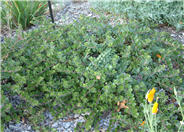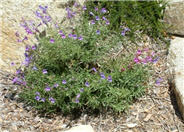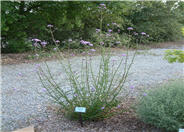
Common name:Kinnikinnick Bearberry
Botanical name:Arctostaphylos uva-ursi
A hardy, creeping evergreen shrub, it grows 6-12" high and spreads as much as 10-12'. It has glossy green leathery leaves attached to dark brown branches. Its flowers are white to light pink in late winter and early spring; berries are bright red.

Common name:Santa Barbara Daisy, Mexican Daisy
Botanical name:Erigeron karvinskianus
This low mounding perennial is used as a ground cover since it reaches 2' tall and spreads 5'. It has fine textured, green leaves and white to pinkish, daisy-like flowers with gold centers that bloom spring through fall in coastal areas. In warmer, inland areas, the plant appears to be semi-dormant but will perk up as soon as the weather starts to cool. Control its growth with watering as it can be invasive in some areas. It looks best in full sun in coastal areas but prefers afternoon shade in warm, inland areas. It attracts bees. This is a great plant for rock gardens, planters, containers, or spilling over walls.

Common name:Prostrate Rosemary
Botanical name:Rosmarinus officinalis 'Prostratus'
The 'Prostratus' grows to a height of 2-3' with a spread to 8'. Its flowers are pale, lavender-blue in color, and the leaves are needle-like with a dark, blue-green color.
This plant makes a good ground cover, and its leaves can be used as seaso

Common name:Foothill Penstemon
Botanical name:Penstemon heterophyllus
This perennial will grow 1.5'-2' tall and 2-3' wide. It has glossy, blue/green foliage with flowers that vary in color and bloom from spring through early summer.

Common name:Howard McMinn Manzanita
Botanical name:Arctostaphylos densiflora 'Howard McMinn
This shrub is highly appreciated for its decorative characteristics, which include a dense show of small, pale pink, urn-shaped flowers. Above all, it is the mahogany-red to brown bark (which peels beautifully) that is the major attraction.
Its fruit

Common name:Brazilian Verbena
Botanical name:Verbena bonariensis
This 4-5' plant is a drought-hardy performer, with blooms atop the sturdy, squarish stem all summer and fall. The flower is a striking purple tuft that makes a good fresh or dried flower. The sparse foliage makes this a great accent flower that hovers. This plant is potentially invasive as it self-seeds through wind, water and animals. If your property is adjacent to a channel, please consider NOT planting Verbena bonariensis as it can end up clogging the channel or suffocating trees.
Designer: Urban Flora Landscape Design
Photographer: GardenSoft
Incorporate compost 6" into your soil to retain water, reduce compaction, feed earthworms, and provide valuable nutrients to your plants.
Attract, or buy beneficial insects such as ladybugs and lacewings to control pest outbreaks in your garden.